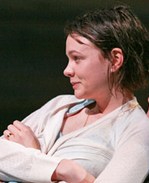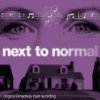SITE GUIDE
SEARCH
REVIEWS
REVIEW ARCHIVES
ADVERTISING AT CURTAINUP
FEATURES
NEWS
Etcetera and
Short Term Listings
LISTINGS
Broadway
Off-Broadway
NYC Restaurants
BOOKS and CDs
OTHER PLACES
Berkshires
London
California
New Jersey
DC
Connecticut
Philadelphia
Elsewhere
QUOTES
TKTS
PLAYWRIGHTS' ALBUMS
LETTERS TO EDITOR
FILM
LINKS
MISCELLANEOUS
Free Updates
Masthead
A CurtainUp Review
Through A Glass Darkly
By Elyse Sommer
| I think the only thing Maxie and I have ever
really talked about is Dad. He's our obsession. —Karin, who's tried ever since her mother's death to make things in the family fine, but has come to realize that they were never fine. But according to the father they obsess over, tells her that she must learn, as her mother never did, to accept imperfection. |

Carey Mulligan and Jason Butler Harner
(Photo: Ari Mintz) |
While I found myself more caught up in the American premiere currently at the Atlantic Theater's temporary East Village home than Lizzie, I too found that it was the remarkable young British actress Carey Mulligan who now portrays Karin, who was the main reason to see this screen-to-stage Through A Glass Darkly To be honest, this early Bergman film, its Oscar notwithstanding, isn't as memorably worth seeing at different stages of one's life as, say, Fanny and Alexander and Scenes From a Marriage.
Ms. Worton's adaptation remains true to the film's darkness and plot and taps into its haunting theatricality and it's format as a four-actor chamber piece does fit today's economically dictated need to tell a story with a small cast. Director David Leveaux, who is currently represented on Broadway with Arcadia has come as close as you can get to making the film stageworthy. His set designer, Takeshi Kata has created a blue-gray monocromatic equivalent of the film's black and white look. Though wide open to reveal the beach front and interior rooms of a Swedish island home emits an empty, eery and claustrophobic aura. This foreboding atmosphere is further enhanced by David Weiner's lighting and avid Van Tieghem's sound design .
Despite Leveaux's excellent and filmic staging, however, nothing can truly replicate the unique cinematography of the original film and the intense closeups that were Bergman hallmarks; nor does Jenny Worton's adaptation fully capture the poetic symbolism of Bergmann's trilogy about faith of which Through A Glass Darkly, is the first (Bergman took his title from a passage in St Paul's letter to the Corinthians about faith, hope and charity). The Worton changes in the text make Bergman's early and unique take on mental illness and family dysfunction tend to come closer to the typical dysfunctional family genre. That's why Bergman aficionados who want to revisit this story, will probably prefer to do so via the still available DVD.
But if you appreciate outstanding acting, forget all the above.
Carey Mulligan, who wowed audiences as Nina in the 2008 Broadway revival of The Seagull, brings a luminosity and fragility to the role of the mentally ill Karin that's simply stunning. Her character was actually based on Bergman's s third wive Kabi Laretel, a concert pianist. Mulligan is well supported by the three men hoping to connect with and help her, as she is desperate to bring the fractured family together.
In the fictionalized story, the men who make up Karin's troubled universe are Martin (Jason Butler Harner) ,a doctor; David (Chris Sarandon), her father who's a her second rate but successful novelist; and her 18-year-old brother Max (Ben Rosenfield) who, though still dealing with his awakening sexuality is also writing plays which he wants his writer-father to approve, shades of young Konstantin in Ms. Mulligan's triumphant The Seagull.
The production gets off to a fine start as we hear the rush of the sea and laughter and the four actors rush forth from the beach backdrop, dripping wet. We learn that they've come on a holiday to the family's remote island retreat, which Bergman fans will recognize it as Faro the small Swedish island where he lived and died and shot a number of his films. All four seem happy and relaxed, and Karin is quite exultant at reexperiencing the beauty of the beach and declaring "everything will be perfect this holiday."
But as that "this holiday" immediately hints at previous holidays marred by the decidedly imperfect family dynamic, everything is less perfect than ever. A discussion between Martin and David reveals that though Karin is no longer hospitalized, her schizophrenic episodes will probably happen again (as they did for her mother until she died).
As the dark tide beneath the sea's tranquil surface is echoed by the various scenes , it becomes clear that all four of these people are trapped in their own inner islands: Karin in her world of hearing birds and voices portending release (by God?) on the other side of a wall . . .Martin in his doctor's belief that rest and medicine can help his wife and his frustration at her sexual rejection. . . David who has always been too absorbed in his need to be a great and not just a successful writer to be there for his family, who even now sees his daughter's illness as fodder for his ambition. . .young Max dealing with his own emerging sexuality and creativity is unable to resist his sister's incestuous impulses.
This is not an easy story story to watch and, even at just 90 minutes, somehow feels long, But anyone who writes it off as a second best version of the film, will be missing a bravura performance by Mulligan. Her stage and film work indicate that while her Karin is doomed, she is a superstar whose every performance, whether on stage or screen, you won't want to miss.
It's also interesting to see this early Bergman work as a brave if imperfect attempt to explore Ingmar Bergman's work in another format. With the Bergman estate becoming more flexible in allowing adaptations, this Through A Glass Darkly may become part of a whole new catalogue of screen-to-stage adaptations by adventurous directors. Some, like the Dutch adaptation of Cries and Whispers by Ivo van Hove, known for his deconstructions of classic texts that's on BAM's fall calendar, likely to intensify the conversation about the theatrical adaptability of the legendary filmmaker's work.
|
Through the Glass Darkly Adaptation by Jenny Worton of Ingmar Bergman film Directed by David Leveaux Scenic design by Takeshi Kata Costume design by Jess Goldstein, Lighting design by David Weiner Original music and sound design by David Van Tieghem Dialect Coach: Stephen Gabis Stage Manager: Jenna Woods Running Time: 90 minutes, without intermission Atlantic Theater at New York Theatre Workshop 79 East 4th Street212-279-4200 From 5/13/11/ opening 6/06/11; closing 7/03/11 |
|
REVIEW FEEDBACK Highlight one of the responses below and click "copy" or"CTRL+C"
Paste the highlighted text into the subject line (CTRL+ V): Feel free to add detailed comments in the body of the email. . .also the names and emails of any friends to whom you'd like us to forward a copy of this review. Visit Curtainup's Blog Annex For a feed to reviews and features as they are posted add http://curtainupnewlinks.blogspot.com to your reader Curtainup at Facebook . . . Curtainup at Twitter Subscribe to our FREE email updates: E-mail: esommer@curtainup.comesommer@curtainup.com put SUBSCRIBE CURTAINUP EMAIL UPDATE in the subject line and your full name and email address in the body of the message. If you can spare a minute, tell us how you came to CurtainUp and from what part of the country. |

Slings & Arrows-the complete set
You don't have to be a Shakespeare aficionado to love all 21 episodes of this hilarious and moving Canadian TV series about a fictional Shakespeare Company




